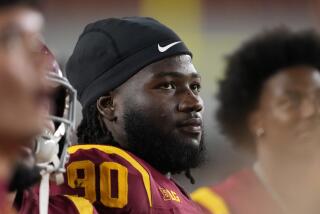Public Spin Stops in Duke Rape Case
For weeks, lawyers for Duke University lacrosse players mounted an aggressive public campaign to discredit a stripper’s accusation that she was raped at a team party.
They released time-stamped photos to counter the dancer’s story, produced a detailed alibi for one of the players, and raised questions about the motivations of a second stripper at the party who said she thought a rape might have occurred.
But last week the spin abruptly stopped. At a meeting Tuesday, the dozen or so attorneys representing most of the players agreed they would not comment further until instructed to do so by lawyers representing the two players charged with rape, said Kerry Sutton, an attorney for one of the other players.
The shift in strategy is similar to that of Durham Dist. Atty. Mike Nifong, who talked early and often about the investigation, but in recent weeks has made few comments.
The new silence suggests that both sides are struggling to handle a case that has captured national attention -- the kind that demands a talent for public relations long before any trial date.
For Nifong, who faces two challengers in an election Tuesday, his public discussion of the case could cost him his job. Early on, he called the suspects “hooligans” and faulted other team members for failing to come forward with information about the March 13 party.
He made the comments before the players had been indicted, and before DNA samples from the accuser’s body had been analyzed. Those tests later revealed no matches with DNA from the 46 players. The results of further DNA tests are expected on or after May 15.
Defense attorneys said the prosecutor’s statements were unfair to Duke players. Nifong’s opponents in the election, Freda Black and Keith Bishop, have echoed those concerns.
Because the accuser is black and the suspects are white, the criticism could resonate with residents who wonder whether Nifong took a strong public stand against the players to score political points in a county that is 38% black.
“I would be livid if what happened to those young men happened to my daughter,” Bishop said at an election forum Tuesday.
The issue adds a layer of complexity to an election that was already seen as a referendum on experience and race. Nifong, who is white, has worked for more than a quarter-century in the district attorney’s office. Bishop, who is black, has no experience as a prosecutor.
Freda Black, a white candidate, is a former assistant district attorney who successfully prosecuted Durham novelist Michael Peterson in a high-profile 2003 murder case. At the forum, she noted that she had made no public comments about the Peterson trial until it was over.
Some experts say defense attorneys’ decision to disclose key elements of their argument to the press could backfire.
“Once your client has been charged or has been indicted, then at some point it’s potentially risky to release that favorable information to the prosecutor or to the media, because it might allow the prosecution time to explore the evidence more,” said Margaret Lawton, a former federal prosecutor and an associate professor at the Charleston School of Law in South Carolina.
At the same time, the attorneys were responsible for defending their clients’ reputation.
The clients “don’t want all their classmates thinking they’re rapists,” said Craig Lerner, a professor at George Mason University School of Law in Virginia.
Both sides learned Thursday that the accuser filed a 1996 police report in the nearby city of Creedmoor, N.C., saying she had been raped by three men three years earlier, when she was 14. Creedmoor Police Chief Ted Pollard said Friday that none of the men named in the 1996 case was charged. Pollard said it was unclear why the case was not pursued further.
The investigation could have been dropped because the woman recanted her testimony or because police did not find enough evidence to support her allegations, he said.
Nifong, in a statement Friday, said North Carolina’s rape shield law might prevent the earlier police report from being introduced in court.
If it is introduced, the defense could possibly draw damaging conclusions from it, said Brian Aus, an experienced Durham defense attorney who has no connections to the Duke case. Then again, he said, the prosecution might be able to explain why the case was dropped.
“It may make the state’s case harder,” he said. But barring any further information, he said, “it doesn’t make the case go away.”
Some potential bombshells were revealed when the two sides were talking openly to the media. According to Newsweek magazine, Nifong has “hinted” that the accuser was given a date-rape drug.
The defense’s statements have disclosed other topics that could dominate a trial, including questions about timelines, the credibility of witnesses and the prosecution’s method of identifying suspects.
The accuser’s version of events is laid out in court documents: She and the other stripper, Kim Roberts, had been hired by a lacrosse team captain and were each paid $400. The accuser arrived at 11:30 p.m., joining Roberts at a house rented by three lacrosse co-captains. They began to dance -- Roberts said in interviews that they began their routine around midnight -- but the men became “excited and aggressive,” and one threatened to sexually assault them with a broomstick. The women were frightened and decided to leave, but when they arrived at their car, one of the men apologized and persuaded them to go back in.
Moments later, the accuser said, she was separated from Roberts and two men pulled her into a bathroom. The door closed. “Sweetheart, you can’t leave,” one of them reportedly said.
The accuser said three men then hit, kicked and strangled her while she was raped and sodomized for 30 minutes. She fought back, losing a few redpolished fingernails in the struggle, she said. She also said the $400 in $20 bills she was paid for the dance was taken from her purse.
The dancers allege the men at the party yelled racial slurs at them. A neighbor reported hearing a man yelling a slur at the women as they drove off. Roberts placed a 911 call at 12:53 a.m. saying someone had directed a slur at her friend. When she called, however, she said she was just passing by the house. She told a local TV station she didn’t mention she was a stripper because she didn’t want her family to find out.
At 1:22 a.m., police responded to a 911 call at a nearby grocery store. A security guard there said the accuser appeared drunk and would not get out of Roberts’ car.
The accuser was taken to Duke University Medical Center, where a nurse specializing in sexual assault determined her injuries were consistent with vaginal and anal rape.
Police later served a search warrant at the house, recovering four red fingernails and $160 in $20 bills.
The players have denied that any assault took place, and their attorneys paint a very different picture of the evening.
Attorney Joseph B. Cheshire V told the Raleigh News & Observer the dancer was “substantially impaired” when she arrived at the party. He also produced time-stamped photos that showed she had cuts and bruises before the party.
The two dancers, he said, performed for only three minutes, starting about midnight. Angered by lewd audience comments, they locked themselves in the bathroom for about 20 minutes. Some players accused them of cheating them out of their money. The women left the house a few minutes later.
A photo stamped 12:37 a.m. shows the accuser lying on the back steps of the house. It appears she has fallen. A photo marked four minutes later apparently shows a player helping her into the car.
Defense attorneys for the two students charged -- Reade William Seligmann, 20, and Collin H. Finnerty, 19 -- have said that both men will be able to prove that they took no part in an assault.
Attorneys produced a detailed alibi for Seligmann, saying he made a series of cellphone calls between 12:05 a.m. -- two minutes after the dance ended -- and 12:24 a.m.
Moez Mostafa, a cab driver, said he remembered picking up Seligmann from the party about 12:20 a.m. He also showed a computer log that listed Seligmann’s call to his company at 12:14 a.m. Mostafa met Seligmann and a friend at a nearby intersection. He said he drove by the house and it appeared quiet.
Mostafa said Seligmann and his friend were calm and pleasant in the cab. He took them to a fast-food restaurant, then dropped them off about 12:45 a.m. on the Duke campus and watched them walk into their dorm.
Mostafa had received a second call, this time a request to pick up someone at the party house. He arrived about 1 a.m. and found students milling around outside. He saw a black woman hurriedly get into a car parked in front of him.
He overheard a partygoer say, “Is she going to call the police?” Another said: “She’s just a stripper.” The woman in the car sped off.
Four students got in the cab and asked Mostafa to take them to the Duke campus. But they changed their minds and asked to be let out a few blocks away, he said.
Roberts, the second dancer, told the Associated Press that the accuser appeared sober when they arrived at the house. She said she doubted the accuser’s allegations at first, but later decided it was possible that a rape had occurred.
The defense has questioned Roberts’ motives for changing her mind. On April 19, Roberts sent an e-mail to 5W Public Relations in New York, which the firm released.
“I’m worried about letting this opportunity pass me by without making the best of it,” she wrote, adding she wanted to “spin this to my advantage.”
Defense attorneys also drew attention to the fact that Nifong agreed on April 17 to waive bail-bond fees for Roberts after she was arrested for violating probation. Court records show that the probation stemmed from a 2001 embezzlement conviction.
The defense has also criticized the prosecution for showing the accuser only pictures of lacrosse players when she was asked to identify her assailants. The defense argued the method would not hold up in court.
Nifong said he hoped to win an indictment of a third player. But, he said, he will not present a case when the grand jury meets Monday because it is a day before the election.
“Even I would think that would look political,” he said at the forum last week.
Tuesday’s election is a Democratic primary. No Republicans are running for the office. If no candidate gets more than 40% of votes, a runoff will be held May 30. The new term starts Jan 1.
Despite their criticism, Nifong’s opponents have not said they’d drop the case if elected.
Nifong’s next chance to present evidence to the grand jury is May 15.
More to Read
Go beyond the scoreboard
Get the latest on L.A.'s teams in the daily Sports Report newsletter.
You may occasionally receive promotional content from the Los Angeles Times.










